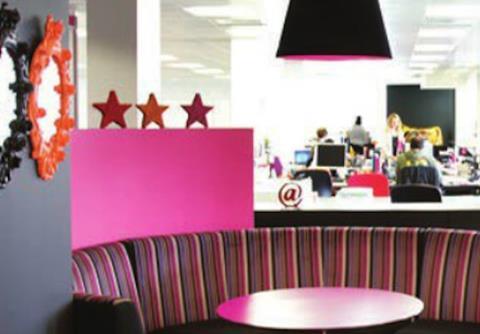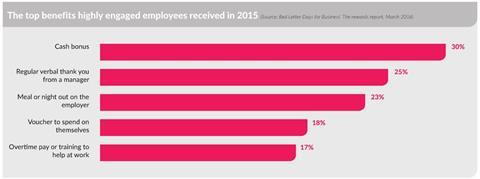
Need to know
- Gift cards can be a great way to reward staff, but reward and benefits managers should think carefully about how they present the vouchers to maximise their impact.
- Keeping a wide-ranging workforce engaged can be a challenge; gift cards are a great way to keep everyone happy.
- E-codes are a hot new trend in the gift card market, but some employees may still favour the tangibility of a paper voucher.
A high-flying corporate lawyer friend recently worked late on a Friday night, one of several she had sacrificed in recent weeks. Any resentment she might have felt evaporated early the following week, when her manager nominated her for one of the organisation’s regular awards for working beyond the call of duty. Her prize? A £150 gift voucher of her choice.
“I’m trying to decide what shop I want gift vouchers for,” she said, excitedly. “John Lewis? Selfridges? Or even some flight vouchers to put towards my next holiday.”
When used effectively, gift vouchers can be an excellent way to reward and motivate staff. More personal than cash and with broad appeal, it is no wonder the gift card industry is buoyant. Well over half (60%) of the members of industry trade body the UK Gift Card and Voucher Association (UKGCVA) reported sales growth in the first half of 2016. From travel gift cards, to discount cards, to gift cards that can be used with a wide range of retailers, there is a card out there to suit every workforce.
The personal approach explains gift cards’ success, says Gail Cohen, director general at the UKGCVA. “Gift cards and vouchers are a great way to give a personal gift to an employee without running the risk of the individual not liking [the] choice, or buying the wrong thing,” she says. “The variety of gift cards and vouchers available on the market these days means that, if an employer can select the right gift card for each employee, the reward gesture can be inspiring and motivating to the individual.”
Gift cards also address a key challenge for modern employers: keeping a diverse workforce engaged. Iain Thomson, director of incentive and recognition at Sodexo Benefits and Reward Services, says: “One thing HR directors are finding challenging at the moment is the multi-generational structure of the workplace. Finding something that appeals to 18-year-olds and 68-year-olds is a challenge. Multi-choice gift cards mean you can have everything from Marks and Spencer and John Lewis through to Argos and more mainstream high street retailers.”
Market developments
From Amazon to Uber, technology is changing the way we live. It is therefore no surprise that the biggest new development in the gift card market is e-cards containing gift voucher e-codes.
Andrew Johnson, chief executive officer at gift card marketing and fulfilment organisation NGC Europe, says: “The growing trend for digital is the most significant change we are seeing in the corporate gift card space. Digital gift cards are easy to administer to staff and we are seeing increasing numbers of retailers starting to issue digital products. Digital, especially in the B2B [business-to-business] sector, will continue to grow, both in popularity and the number of issuers offering these products.”
Keith Herman, managing director at Inspire, which specialises in travel gift cards for holidays, adds: “E-codes are much more popular these days.”
However, he reports that once most people have received a gift card for an expensive holiday, they are still likely to call the provider to discuss their travel options.
Engagement can also vary by age. “The older generation still prefers a card or a voucher of some sort,” says Herman. “Everything will be e-vouchers in the next 10 years, but there’s still something special about giving someone a pack containing a card with money on it, and that being tangible.”
However, e-codes should be used carefully, says Thomson. “One of the dangers for employers is not losing the act of recognising [great performance] through speed of delivery,” he says. “If it’s for an incentive and it’s clear and tactical, there is a place for e-codes, particularly for multi-brand stores, but if it’s for recognition then you can’t beat the peer-to-peer recognition of being awarded a gift.”
Getting the best from gift cards
It is a good idea to keep staff guessing when awarding gift cards, adds Thomson. “If [an employer is] awarding the gift card, regardless [whether it is] single or multi retailer, it’s about it remaining a treat. [An employer] can award someone a card and it becomes part of their utilities, eaten up in a food shop. Then you lose the essence of what that award was for,” he says.
Organisations should think strategically when rewarding staff. For example, some organisations give employees city breaks to reward great performance, says Herman. The employee does not necessarily know how much the employer has spent on the travel package, meaning they can value a £500 spend even more than a cash reward of £1,000.
Giving staff a cash bonus means an employer is running the risk that they will simply spend it on paying off their credit card, for instance. Instead, through travel gift cards, employees receive a treasured memory.
How organisations frame the awarding of a gift card is also important. Thomson says: “It’s not so much about the value of the award, it’s the peer recognition around it. If [an employer has] a really good communication strategy around what [it is] rewarding and why [it is] rewarding [this], [it] can get more value from a £20 reward than a £50 reward. It’s about packaging it properly.”
With multiple operators in the market, how can employers find a gift card arrangement that suits their workforce? Knowing the audience is key. “It’s about aligning the gift card and the retailer with the brand [the employer is] delivering to and [its] employee base,” explains Thomson.

3 Monkeys Zeno uses gift vouchers to recognise staff
PR firm 3 Monkeys Zeno has been awarding gift vouchers to staff for eight years. Christine Jewell, managing director, says: “We surveyed our staff and asked what sort of reward they would value: would they like dinner for two, for instance? Vouchers were what most people said they wanted. Cash gets lost in day-to-day expenses, whereas vouchers [they] can use to treat [themselves].”
The 75-strong organisation has a staff recognition scheme called Monkey of the Month. “We give people £150, with vouchers [they] can use more or less anywhere,” says Jewell.
The organisation makes a special occasion of giving out the gift vouchers. Jewell says: “We ask our staff who has gone the extra mile, tying it in closely to our corporate values. Up to five or six people win it every quarter.
“Every quarter at our [organisational] meetings, I read out the potted narrative of the nominations, and people come up to collect their vouchers.”
Birthdays are another occasion when 3 Monkeys Zeno rewards its staff with vouchers. “We give people about £25 in vouchers for their birthday; they have a choice then and it’s more personal than cash," explains Jewell. “Gift vouchers are packaged nicely and feel like more of a treat.”
Finally, at Christmas, whenever the organisation has had a successful year, each member of staff receives a £50 voucher from Selfridges. “It comes nicely packaged in a box, and everyone loves Selfridges; the whole experience of shopping there is great,” says Jewell.

















